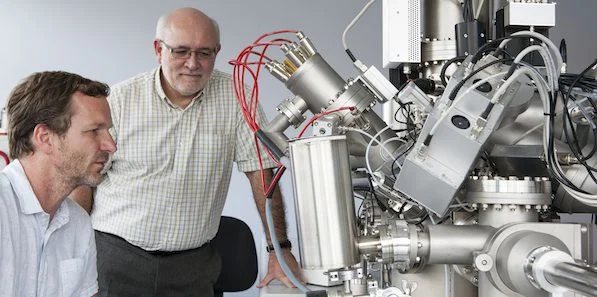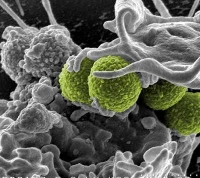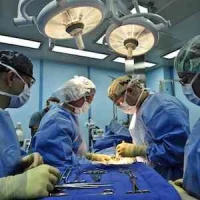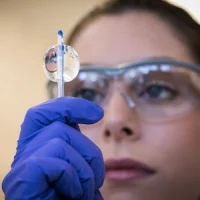Morgan Alexander, Professor of Biomedical Surfaces in the School of Pharmacy and Paul Williams, Professor of Molecular Microbiology, in the School of Life Sciences at the University of Nottingham, have each received a Wellcome Trust Senior Investigator Award worth a combined £2m. These are the first of its kind awards and the two researchers have been recognised for this prestigious honour because of their discovery of a group of new materials that might be capable of repelling bacteria. They are expected to now work on a joint project to exactly understand why bacteria are repelled by these newly discovered polymers.
It is believed that this discovery could lead to a significant reduction in hospital infections acquired through implanted medical devices and may have the potential to improve the quality of health care all over the world. Numerous hospital patients acquire infections through indwelling medical devices such as catheters, intravenous tubes and artificial joints. By controlling these infections, healthcare providers could significantly reduce the number of medical complications and save thousands of lives. This could also translate into significant savings in medical costs.
The award money will now fund a centre of excellence that will be dedicated to studying the underlying mechanisms behind the resistance these materials show to bacterial attachment and to biofilm development. Professor Alexander is aware of the challenges that lay ahead for this joint project. "The polymer material chemistries could not have been predicted from our current understanding of bacterial responses to materials. We will develop new analytical approaches to elucidate the mechanisms by which these polymers resist bacterial attachment encompassing the material and the cells."
It is interesting to note that the discovery by the two researchers took them both by surprise. They were in the process of developing a new high-throughput approach to the study of bacterial attachment to hundreds of materials. Bacteria have a tendency to be attracted to implanted medical devices. They attach to these devices as single cells and then grow as microcolonies. The result is the formation of biofilms that hide bugs and these bugs are protected from the body's immune defences and antibiotics.
During their investigation, they discovered that a group of polymers had the ability to reduce this bacterial attachment. They investigated this finding further by coating silicone devices with these hit materials and discovered that there was a reduction of 97% in the surface area covered by bacteria.
By undertaking further investigation, the research team aims to understand the mechanisms used by bacteria to interact with polymer surfaces and to design improved bacteria resistant polymers in order to prevent device-cantered infections. The research is expected to take an interdisciplinary approach and will combine both material science and molecular microbiology along with state of the art imaging. According to Professor Williams, "Bacteria are highly adaptable micro-organisms and we need to discover the genetic basis of how they sense and respond to chemically distinct polymer surfaces. By combining our expertise in materials science and microbiology we are taking an interdisciplinary approach to solving a major medical problem."
Source: AlphaGalileo
Image Credit: The University of Nottingham
Image Caption: Professor Morgan Alexander and Professor Paul Williams (standing)
It is believed that this discovery could lead to a significant reduction in hospital infections acquired through implanted medical devices and may have the potential to improve the quality of health care all over the world. Numerous hospital patients acquire infections through indwelling medical devices such as catheters, intravenous tubes and artificial joints. By controlling these infections, healthcare providers could significantly reduce the number of medical complications and save thousands of lives. This could also translate into significant savings in medical costs.
The award money will now fund a centre of excellence that will be dedicated to studying the underlying mechanisms behind the resistance these materials show to bacterial attachment and to biofilm development. Professor Alexander is aware of the challenges that lay ahead for this joint project. "The polymer material chemistries could not have been predicted from our current understanding of bacterial responses to materials. We will develop new analytical approaches to elucidate the mechanisms by which these polymers resist bacterial attachment encompassing the material and the cells."
It is interesting to note that the discovery by the two researchers took them both by surprise. They were in the process of developing a new high-throughput approach to the study of bacterial attachment to hundreds of materials. Bacteria have a tendency to be attracted to implanted medical devices. They attach to these devices as single cells and then grow as microcolonies. The result is the formation of biofilms that hide bugs and these bugs are protected from the body's immune defences and antibiotics.
During their investigation, they discovered that a group of polymers had the ability to reduce this bacterial attachment. They investigated this finding further by coating silicone devices with these hit materials and discovered that there was a reduction of 97% in the surface area covered by bacteria.
By undertaking further investigation, the research team aims to understand the mechanisms used by bacteria to interact with polymer surfaces and to design improved bacteria resistant polymers in order to prevent device-cantered infections. The research is expected to take an interdisciplinary approach and will combine both material science and molecular microbiology along with state of the art imaging. According to Professor Williams, "Bacteria are highly adaptable micro-organisms and we need to discover the genetic basis of how they sense and respond to chemically distinct polymer surfaces. By combining our expertise in materials science and microbiology we are taking an interdisciplinary approach to solving a major medical problem."
Source: AlphaGalileo
Image Credit: The University of Nottingham
Image Caption: Professor Morgan Alexander and Professor Paul Williams (standing)
Latest Articles
Infections, bacteria, healthcare providers, polymers, medical costs, savings
Morgan Alexander, Professor of Biomedical Surfaces in the School of Pharmacy and Paul Williams, Professor of Molecular Microbiology, in the School of Life...










